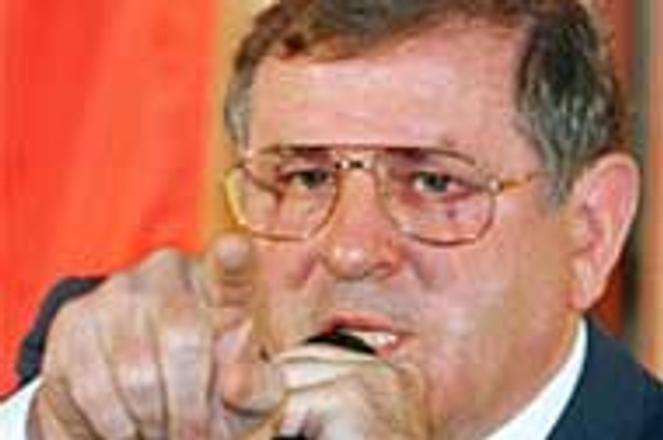Vladimír Mečiar warns voters that a Schuster vote will mean trouble.photo: TASR
Though only two candidates will run in the second round of the Slovak presidential elections, the Central Election Commission has ordered the Interior Ministry to print out three separate sets of ballots. One is the version that will most likely be used: that which pits Prime Minister Vladimír Mečiar against SOP chairman Rudolf Schuster. The others substitute the name of the third highest vote-getter, Madga Vášárýová, for one of the top winners, creating three separate election scenarios.
Why the expense of the other two versions?
The reason, according to legal experts and analysts, is rooted in a failure in Slovak election law to provide for a smooth transition in case one of the candidates drops out of the second round or dies before it can be completed. Currently, a candidate is permitted to drop out even hours before the final vote takes place, a move which would cause political havoc and perhaps, pundits say, weaken the ruling coalition.
Conspiracy theorists and analysts have been saying for weeks that Mečiar, believing he can't win on votes alone, might take the drop-out route and then label unfair the political forces which caused his demise. For his part, Mečiar has denied he will leave the race; but the ballots stand prepared, just in case.
"I have declared that whatever considerations about my withdrawal are pure speculations or godly wishes of my adversaries," Mečiar said at a May 18 press conference in Bratislava.
The three different kinds of ballots are intended to secure that the May 29 vote will take place. However, despite the provision, some analysts and legal experts claim the election can still be deadlocked if either of the candidates leaves the election or dies too close to election day.
The problem has caused some voices to call for a strengthening of the direct presidential election law. Eduard Barány, director of the State and Law Department at the Slovak Academy of Science and also a member of the Central Election Commission for the Presidential Elections, claimed that the law should be toughened against intentional drop-outs or infractions.
"The shortage of the election procedure is that it lacks provision that would stipulate the deadline until which the candidate could officially withdraw his candidacy," Barány said. "In the current situation, if the candidate announces his withdrawal an hour before the election, it's technically impossible to distribute the alternative ballots and make the vote happen."
According to Barány, the Interior Ministry is prepared to distribute the three different ballots to regional election centres the country. But he added that even if all three ballots were to be spread around to the approximately 6,000 polling sites before-hand, practically speaking there would still be problems, as the "mess with choosing which ballots should be used would create even more doubts about the regularity and exactness of the elections."
The analysts say that the election law should at least contain a provision which would set a limit as to how soon before the vote a candidate could leave the race. Politicians who put the decree together, however, say that such a provision would sometimes make little difference.
"Even if you banned them [the candidates] from withdrawing let's say 48 hours before the election, you wouldn't be able to ban them from dying [within those 48 hours]," said Peter Kresák, deputy for the Party of Civic Reconciliation, and one of the composers of the law on direct presidential elections. "Something like this is impossible in any legal system," he said.


